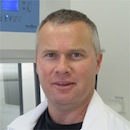Advisory Board and Editors Agricultural Science

Ana I.F. Ribeiro-Barros
PhD in Plant Molecular Biology (1997, Wageningen University and Research);
Director of the Tropical College, University of Lisbon (ULisboa);
Head of Research Lab and Professor of Cell Biology, Biotechnology, Microbiology and Tropical Ecosystems (School of Agriculture, ULisboa);
Invited professor Universidade da Madeira (Portugal), Eduardo Mondlane University and Gorongosa National Park (Mozambique;
Area of scientific activity (25+ years): Agrobiotechnology applied to the management and characterization of agro-forestry resources: Biodiversity; Conservation Genetics; Ethnobotany; Landscape genomics; Molecular Ecology; Plant-Environment Interactions (symbioses, pathogenesis and abiotic stresses); Soil diversity.
Scientific Identifiers:
Ciência Vitae: 081F-E3CE-9D52
ORCID: 0000-0002-6071-6460
Scopus: 35557486600
Google: https://scholar.google.pt/citations?hl=en&authuser=2&user=hzAWUTUAAAAJ

Coen J. Ritsema
Professor of Soil Physics and Land Management at Wageningen University, the Netherlands. Recipient of Honorary Professorships at i) Deakin University, Australia, ii) the Institute of Soil and Water Conservation, Chinese Academy of Sciences, China, and iii) Moscow State University of Environmental Engineering, Russia.

Luiz F. W. Roesch
Dr. Luiz F. W. Roesch is an Associate Professor within the Department of Microbiology and Cell Science at the University of Florida.
Dr. Roesch is microbial ecologist working with biomarkers of health and disease in human samples and of homeostasis or perturbation in environmental models. His research focuses on testing fundamental hypotheses in microbial ecology, especially in the Human Microbiome.
Dr. Roesch's primary expertise is in Next Generation Sequencing, Bioinformatics, and 16S rRNA surveys.

Arnold R. Salvacion
Arnold is a Research Fellow at Centre for Crop and Disease Management, Curtin University. He is an environmental scientist with more than 15 years of research experience in agriculture, natural resource, applied climate science, human ecology, quantitative geography, and geographic information system. In 2021, he was awarded as one of the Outstanding Young Scientists by the National Academy of Science and Technology (Philippines) for his contribution to the advancement of human ecological research in the country. He is the founding Editor-in-Chief of the Journal of Human Ecology and Sustainability and also serves on the Editorial Board of Spatial Information Research, and SN Social Sciences.

Harpinder S. Sandhu
Senior Lecturer, School of Natural and Built Environments, University of South Australia; Leading research on ecosystem services in managed landscapes, agro-ecology and natural resource management.

Ahmet Tansel Serim
Dr. Ahmet Tansel Serim is an Associate Professor at Bilecik Seyh Edebali University. Turkey. He completed his B.Sc. in Plant Protection at Ankara University in 1997, and his Ph.D. in Weed Science at Ankara University in 2010.
Dr. Serim has worked at the Plant Protection Central Research Institute as an agricultural engineer, Directorate of Testing Agricultural Machinery and Tools, and General Directorate of Agricultural Research and Policy. He has also been a visiting researcher at Tuscia University, researching sustainable soil and water management.
Dr. Serim's research interests include weed science, weed biology and ecology, weed management strategies, herbicides, herbicide resistance, integrated weed management, rare arable weeds, weed suppression, allelopathy, cropping systems, population dynamics, carryover of herbicides, water stress-effects on crops and selectivity of herbicides.

Anshuman Singh
Dr. Anshuman Singh is a Senior Scientist (Horticulture) at ICAR- Central Institute for Subtropical Horticulture, Lucknow, India. His primary research interests include genetic improvement of tree fruits such as mango, guava and Indian blackberry (jamun) for higher fruit yield and quality, and tolerance to insect-pests, diseases and environmental stresses such as salinity.

Mark M Smits
Lector (lecturer) at HAS University of Applied Sciences in the fields of biology, soil science and data analysis. Previously worked as postdoc at Hasselt University, Lund University and University of Sheffield. PhD in soil science and geology at Wageningen University.

Peter S. Solomon
Professor, Wheat Biosecurity. Australian Research Council Future Fellow, Research School of Biology, The Australian National University. Associate Editor of Functional Plant Biology

Valeria Spagnuolo
Valeria Spagnuolo is Associate Professor in Botany at the Department of Biology at the Federico II University of Naples. She obtained a Ph.D. in molecular systematics (plants) and the scientific qualification to Full Professor 05/A1 (Botany) during the ASN 2018.
Dr. Spagnuolo was involved in several research projects, with a focus on biomonitoring and phytoremediation, within her task/unit and in international teams (the most recent ones: EU Project FP7- ENV.2011.3.1.9-1 Mossclone (2012-15); LIFE11 ENV/IT/275 Ecoremed (2012-2017); PON 03PE_00107. Biopolis (2013-2017).
Dr. Spagnuolo's expertise includes genetic variation in natural populations of mosses along environmental gradients; biomonitoring of air quality by cryptogams and vascular plants; and phytoremediation of metal-polluted soil. In recent years, her long research experience has been centred on plant response to abiotic stresses and biomonitoring of indoor air pollution.
She is involved in editorial activities, as a reviewer for international journals (e.g. Environmental Pollution, Frontiers in Plant Science), as a guest editor in Atmosphere and Plant Journals, and as an editor of the latest Italian edition of Raven (Zanichelli).
Dr. Spagnuolo has published over 60 publications (Scopus ID 6602352988), with an h-index 20 and over 1200 citations. She also detects a patent as the inventor of a tool for biomonitoring of air quality (EP 3 076 171 A1).

Martha Vives
Full professor, Biological Sciences Department, Los Andes University. Vice dean for Research Affairs, School of Sciences. Past coordinator for the Microbiology program.

Robert Winkler
Robert Winkler is Principal Investigator of the Laboratory of Biochemical and Instrumental Analysis at the CINVESTAV Unidad Irapuato and faculty member for the postgraduate programs Plant Biotechnology and Integrative Biology. His research topics include novel mass spectrometry techniques such as low-temperature plasma ionization and covalent protein staining, new approaches in the high-throughput metabolomic profiling of plants, computational mass spectrometry and proteomics.

